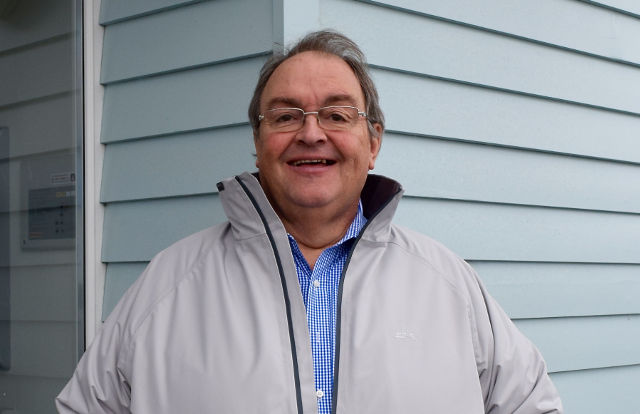Louisa shares this latest news from Cowes Harbour Commission. Ed
Cowes Harbour Commission (CHC) has announced the appointment of David Riley as new Chair to the CHC Board. He succeeds Roger Mathias who, after serving nine years as Commissioner, including two terms as Chairman, will retire at the end of his third term on 30th April 2016.
Sailing since the age of nine
David Riley, 63, was appointed to the Board in 2009 as Commissioner for finance and will take up the position of Chairman on 1st May 2016. He has been a practising chartered accountant since 1978 and expects to continue in the profession as a working partner in a London-based firm during his tenure as Chairman. As part of his work, he is also a director of an international association of professional firms.
He and his wife have owned a house in Cowes since 1988 and have lived in Cowes for the past 13 years.
Growing up on the East Coast, David learned to sail aged nine, and like many sailors, his introduction to Cowes was Cowes Week. He has kept various boats in Cowes since 1989 and for the last nine years has owned a 33ft racer-cruiser, which he occasionally races in the Solent.
Commenting on his appointment, David said:
“I don’t believe the role of Harbour Commissioner is particularly well understood by our stakeholders. When I first considered applying to be a Commissioner, I had absolutely no idea what the Harbour Commission was, what it owned (apart from Shepards) or how it was managed. I did not really know what a Commissioner was!”
He continued,
“When I applied it was essentially for the role of Commissioner responsible for finance and governance. So I did some research into what the role of a Commissioner was, and found out that in fact it wasn’t to represent the stakeholders, it was to apply one’s expertise, such as you had, in assisting on a non-executive basis in the governance of the statutory harbour and its associated businesses.
“The representation of stakeholders is carried out by our well qualified Advisory Committee and we are also extremely fortunate in having a document produced by the Department of Transport, called ‘Modernising Trust Ports’, which describes in detail the duties and responsibilities of Commissioners.”
Leading the port
David went on:
“I’ve been a Commissioner for quite a time now so I have a pretty fair idea of how the Harbour Commission works. As Chairman, I see my role as leading the port, along with the Chief Executive, and ensuring that the management applies the strategies that we adopt, to their day-to-day work.”
The Harbour Commission still has the overall objective of making Cowes a true sheltered harbour by delivering the breakwater, which is completed and in which David has been quite involved, as well as a dredged Eastern Channel and an extension to the Shrape breakwater for the purposes of affecting the wave climate. David added:
“While this development allows for the conditions to enable a new marina as part of the government-backed East Cowes regeneration project and while we have nothing against that, I would add that it’s not CHC’s project; it’s the project of an independent developer and our interest there is to ensure that we obtain the right funds from the developer to enable us to transform Cowes into a sheltered harbour environment.”
Need for safety
The harbour protection programme is a large project and there will be plenty else to do when that is done, but above all, David emphasised, the Board has a duty to maintain an open and safe port.
“I believe that the need for safety in the port is the most important thing that Commissioners should be aware of.”
The Commission also has to consider the proposed development for the Medina Valley, and how CHC’s own Kingston Marine Services site should be promoted to assist in further marine development up the river.
David stated:
“This is very fluid at the moment; the recent turndown in planning permission for Red Funnel obviously has an effect on that, and Cowes Harbour Commission has its view on development in the Medina Valley, which my predecessor wrote in a letter to the Isle of Wight Council on 3rd November 2015 – and that remains.”
Challenges for the harbour
David acknowledged that there will be challenges ahead for the harbour, but there are also opportunities. He said:
“I’m keen to receive ideas from stakeholders for further development; it’s quite clear that there is still a lot we could do. Cowes Harbour does not resemble what it was pre-2001, we have a much larger Yacht Haven, which is owned and managed by a local charitable trust, and Shepards Wharf – which we own and manage, had not been developed. The Squadron Haven wasn’t there, and Trinity Landing didn’t exist, so there is consistent development going on and there are plenty of further opportunities. Some of these will be brought about by a calmer harbour; some are brought about just by progress.
“One of the things that a healthy harbour will do, is bring more people into the town; this becomes particularly necessary in the modern age when boats can race off Cowes and not have to come in to make declaration. So, it becomes extremely important that we make Cowes attractive,” concluded David, “as we know that a healthy high street helps a healthy port, and a healthy port helps a healthy high street.”
Tribute to current Chairman
David finished by paying tribute to his predecessor Roger Mathias, an engineer by training who held a number of senior management posts in industry before becoming a Harbour Commissioner in 2007 and Chairman in 2010.
“During Roger’s six years as Chairman we have moved from the Outer Harbour Project being little more than a very good idea, to the situation where we have an outer breakwater. His quiet and diligent approach has assisted greatly. From a governance of the harbour perspective, Roger will be an extremely hard act to follow, and, I’m here to do my best.”





